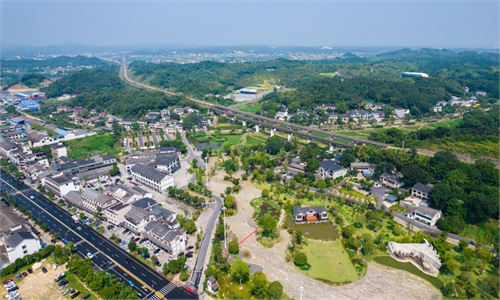SOURCE / PRESS RELEASE
Digital villages in Leishan county become new engine of revitalization

A view of guesthouses in Baiyan in Leishan county Photo: Courtesy of Leishan Rural Revitalization Administration
Leishan county is located in the mountains of Qiandongnan Miao and Dong Autonomous Prefecture, Southwest China's Guizhou Province. The county has well-preserved traditional dwellings of Miao ethnic group and staggered terraces. Nowadays, relying on the emerging technologies including the internet, cloud computing and big data, these villages have been networked with the world.
In recent years, Leishan county and China Mobile Guizhou Co have jointly created a number of "digital demonstration villages," with digitalization and information technology integrated into the local rural life scenes, improving residents' life quality and bringing development opportunities for local industries.
Convenient life
Li Guangkui, a resident in Baiyan village of the county, operates a small store. In Li's view, life is now as convenient as living in the city. Villagers now have been used to paying with smart phones after purchasing goods. Li's home also installed fiber optic broadband, and his young grandson can chat with his parents working out of hometown via video. These urban network applications are becoming part of the daily life of villagers in the mountains of Leishan county.
Since December 2021, in order to speed up the construction of "digital villages," the Leishan Branch of China Mobile Guizhou Co has built a number of 5G base stations and opened gigabit fiber broadband for Baiyan village and Longtang village, starting the digital transformation of the two villages.
Leishan has completed 70 percent of the transformation of digital intelligent system, installing more than 40 sets of home alarms for rural empty-nest elderly, left-behind children and disadvantaged groups with poor self-care ability. In addition, the county also installed more than 20 smoke detectors and accessed the intelligent firefighting cloud platform of China Mobile Guizhou Co to enhance professional firefighting early warning capability.
"Now I see via the video monitoring platform every day if there are people littering in the village, and receive timely information about the elderly and children seeking help," Wang Ruo, an official of Longtang said.
According to a statement, Leishan Rural Revitalization Administration said that the county has built a video surveillance system to realize the monitoring of village entrances and exits, main roads, schools and other key areas, in order to improve habitat environment management, safe production and other comprehensive governance capabilities.
In 2022, the county established a public service center for e-commerce, reducing distribution costs and delivery time. At the same time, the county provides convenient service functions including express logistics, insurance purchase and payment of fees and others, so that villagers can enjoy a convenient life and services without leaving home.
Empowering an industrial upgrade
From July to August 2022, guesthouses in Baiyan and Longtang were fully booked. Relying on excellent ecological resources, coupled with the empowerment of digital construction, the guesthouse economy in Leishan has grown considerably with enhanced risk resistance.

Tourism industry in Leishan county Photo: Courtesy of Leishan Rural Revitalization Administration
"We used to rely on telephone reservations, but now more than 50 percent of customers book the gues through the internet. We also take some short videos and publish them online, which attract many tourists," Luo Bin, business manager of a B&B company in Longtang said.
The company has a total of 18 houses, all of which are connected to gigabit broadband, with 5G network capability, according to Luo.
In addition to empowering the tourism industry, the construction of digital village is also playing a role in helping to upgrade traditional industries in the county. Leishan has revitalized rural industrial resources by building an e-commerce platform for local agricultural products.
According to Leishan Rural Revitalization Administration, through the platform, consumers can view the planting and breeding environment of more than 20 villages' agricultural products including Baiyan's fish and Nanmeng's white tea in real time via 5G livestreaming, allowing them to purchase more conveniently.
"In the past, due to the lack of publicity, we have to sell around with unstable income. Now through a smart phone, we can sell out the fish and white tea while sitting at home. In 2022, we earned about 20,000 yuan ($2,900) to 30,000 yuan," Yang Wenxing, a resident in Nanmeng village said.
Zu Pibo, director of Leishan Rural Revitalization Administration, said that moving forward, the county will continue to improve digital economic governance, consolidate new digital infrastructure, strengthen digital social governance as well as accelerate digital industrial development.
"We will continue to build up the Leishan digital economy, empowering the transformation and upgrading of traditional industries, in a bid to promote the integration and development of digital economy and real economy, and continuously strengthen the digital economy," Zu noted.
On February 27, 2023, China unveiled guidelines for digital development, unfolding the blueprint and timeline for construction of a "digital China" through strengthening 5G and computing.
According to the guidelines, by 2025, the digital infrastructure will be efficiently connected through a broad range of sectors, and China will become a global leader in digital innovations.
China's digital economy, ranking second worldwide for many years, has become a major growth engine for the country, according to a white paper titled "Jointly Build a Community with a Shared Future in Cyberspace" that China released last year.
In 2021, the value of China's digital economy had reached 45.5 trillion yuan, accounting for 39.8 percent of its GDP, said the white paper.


